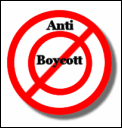 The BIS website recently listed an anti-boycott settlement agreement involving freight forwarder and customs broker International Specialist, Inc., located in Boston, Massachusetts. The charging letter provided this significant bit of information about the alleged violation:
The BIS website recently listed an anti-boycott settlement agreement involving freight forwarder and customs broker International Specialist, Inc., located in Boston, Massachusetts. The charging letter provided this significant bit of information about the alleged violation:
In connection with the transaction described above, on or about August 29, 2003, you provided to a customer in Oman, AEA Technology commercial invoice #102075, Order #CO133795, which contained the following information:
“NO ISRAELI COMPONENTS USED.”
Note that this is not an allegation that the freight forwarded actively provided the proscribed information about Israeli components; rather the freight forwarder merely provided the information passively by delivering shipping documents that contained a statement from its customer that provided the proscribed information.
The freight forwarder was charged with a violation of EAR § 760.2(d) which prohibits any U.S. person from providing information about that person’s or a third party’s business relationships with a boycotted country. Significantly, however, EAR § 760.1(e)(3) makes clear that intent is required for each anti-boycott violation and not merely the intent to perform the act that constituted the violation but also the “intent to comply with, further, or support an unsanctioned foreign boycott.”
This high-standard of intent is inconsistent with what looks like an effort by BIS to impose absolute liability on freight forwarders for forwarding commercial documents with proscribed information. Perhaps International Freight actually read every word of the customer’s invoice to the recipient in Oman and therefore had the requisite intent. But BIS doesn’t allege that and, frankly, it seems unlikely that International Freight bothered to scour all the terms of AEA’s invoice before forwarding it along with the shipped goods.
 Permalink
Permalink
Copyright © 2006 Clif Burns. All Rights Reserved.
(No republication, syndication or use permitted without my consent.)

 Posted by
Posted by  Category:
Category: 

